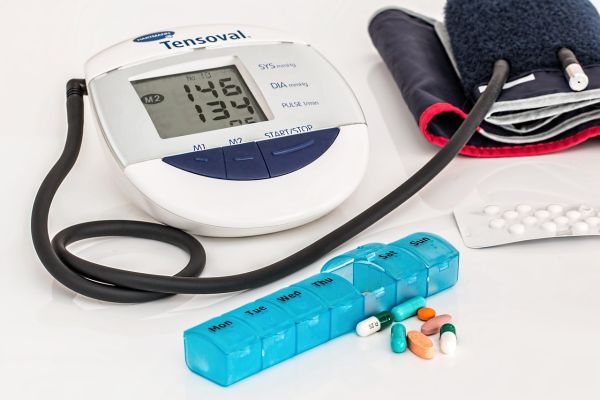
Chronic Illness
A chronic illness is a condition that endures for at least a year and requires ongoing medical care or consistently limits the scope of a person's daily activities. Major chronic conditions include cancer, heart disease, diabetes, lung disease, asthma, HIV/AIDS, stroke, arthritis, multiple sclerosis, epilepsy, Crohn's disease, chronic fatigue syndrome, fibromyalgia, and kidney disease, among others. Tens of millions of American adults live with a chronic illness, and many of them live with at least two. Life with a chronic illness typically requires lifestyle changes that may be challenging or stressful to adopt, such as a new diet or exercise regimen, demanding medication and checkup schedules, and limitations on social life, work, and travel. Any of these can cause stress, anxiety, anger, and in some cases, depression.
Contents

Grief, for a lost lifestyle or for a future that will not unfold as planned, is a common reaction to a diagnosis of chronic illness. So are changes in mood, even from day to day, as well as distress or frustration that one's options and outlook are so dependent on their physical health. Research, however, has consistently found that patients who face the reality of their diagnosis directly, rather than avoiding it, and who seek help rather than retreating, report greater life satisfaction and healthier adjustment. Similarly, those who seek empowerment—for example, by discussing all of their questions with their doctors—report less stress than other patients.
Many people find that reducing their outside obligations and commitments, and prioritizing time with partners and children, can bring some relief from stress. Committing to one small positive goal each day—such as a phone call with an old friend or an outing to the park—can also deliver a boost to one's mood.
Research into the qualities that enable people diagnosed with cancer to remain positive and resilient, part of the field known as psycho-oncology, has found that, along with social support and professional counseling, those who are able to manage their illness for years or decades are able to live in the present, accept mortality, avoid rumination, and take an active role in their treatment and physical health. Such patients tend to remain more positive and in some cases, even come to believe that their diagnosis changed them for the better.
Even those who commit themselves to staying positive as they manage chronic illness may find their mood flagging after several years. They become, one could say, sick of being sick. At those times, experts suggest, honestly acknowledging how they feel and allowing themselves to be upset, reaching out to supportive people, and challenging themselves to find positive aspects of their lives, perhaps with professional help, can enable them to regain a sense of control.
When living with chronic pain or illness, it’s important not to let your condition dictate every aspect of your life, but it’s also important to be realistic. Saying yes to invitations that you know your body likely cannot handle, putting your faith in unproven "miracle" cures, or aiming to have a spotless household, could lead to painful disappointment. Speaking unkindly of yourself because of those limitations can also cause a great deal of emotional pain.
Fatigue is a symptom of multiple chronic conditions and presents one of the most difficult daily challenges people face. Moving on from a perception of one’s ideal day, listening to cues from one’s body, and becoming more flexible with one’s relationships and more comfortable with time alone can put a person in position to get the most out of the moments they are able to embrace.
A person with chronic illness or pain often doesn’t appear ill or limited, which can lead to them being misunderstood when they raise their condition. Others may instinctively talk down to the person, as many people instinctively infantilize the sick. And while the chronically ill often feel invisible, when others do engage with them, they may attempt armchair diagnosis, or insist that the person can do things they cannot. Speaking directly and clearly to people about one's condition, rather than apologizing for it, accepting condescension, or withdrawing from a social life, can help an individual retain their self-respect and self-esteem.

Finding support can be crucial to coping with a diagnosis of chronic illness. Support groups for many conditions meet across the country or communicate online. But support from family and friends is also vital for maintaining a positive outlook, although many newly-diagnosed individuals may struggle with sharing the news for fear of changing or losing valued relationships, or because of worries about being judged. Some people with chronic conditions may feel fine most of the time, but have episodes of illness or fatigue, or they may have to take breaks or put limits on plans because of the demands of self-care. Still, experts suggest that patients be open with loved ones, including about their need for emotional and hands-on support (rides to appointments, help with shopping, cooking, child care, etc.). Many patients underestimate how much support friends and family members will be willing or able to offer. It's also important to establish clear boundaries if there are aspects of one's condition that one is uncomfortable discussing.
Yes. People with chronic conditions generally face a higher risk of depression than others, and their depressive symptoms tend to be more severe. In some cases, medications used to treat a chronic illness may increase one’s risk of depression. Neither those with chronic illness, nor their loved ones, should accept depression as unavoidable but should instead actively seek treatment.
Some research suggests that not only does a chronic illness raise one's chances of experiencing depression but that having depression increases one's chances of experiencing chronic illness such as cardiovascular disease, diabetes, stroke, or Alzheimer's disease. One factor may be that individuals with depression are less likely to devote time to maintaining or monitoring their health, but signs of increased inflammation in those with depression, as well as metabolic changes and abnormalities in their heart rate and stress hormone levels may be factors as well.
People living with chronic illness or pain, and the experts who research the conditions, cite uncertainty as one of the most difficult challenges they face. Not knowing when symptoms may flare, if a condition will worsen, or whether treatment will work, takes an emotional toll. “Illness uncertainty” has been defined as the inability to determine the meaning of illness-related events, and comprises feelings of ambiguity, complexity, deficient information, and unpredictability. Being able to rely on trusted information and experts, and to accept a measure of uncertainty in their lives, can help people cope.
People with chronic illness often find that their relationships with people who had been very close to them change; sometimes those friends “go missing” altogether. Rather than feeling let down by someone, getting angry, or engaging in self-blame, though, experts suggest recognizing that relationships change all the time for reasons that have nothing to do with health, to avoid generating stories about why a friend has fallen out of touch that may not reflect their reality, and, above all, to extend self-compassion to themselves.
People who most successfully adjust to life with a chronic illness tend to assert that there are positive aspects to their diagnoses and their changed lives. In studies of resiliency in chronic illness, such individuals may say that they feel lucky to be alive, as opposed to being unlucky to have cancer; that they are happy to have discovered who their true friends are, and how loyal they are; or that their diagnosis has put their life in fresh, clearer perspective.
An individual may live with chronic pain or illness for as long as decades, and so blaming themselves for their condition, or seeing themselves as inherently deficient, can eventually take an immense emotional toll. Practicing self-compassion is crucial for maintaining mental health, as is accepting uncertainty and the changed pace of their lives, and maintaining the ability to be happy for others.
After experiencing a life-altering event, some people experience the phenomenon known as post-traumatic growth. The term was coined in research by Richard Tedeschi and Lawrence Calhoun, who identified five realms of growth—relating to others, seeing new possibilities, finding personal strength, experiencing spiritual change, and achieving appreciation of life. These experiences are far from universal among the chronically ill but it can sometimes be developed through therapy.
Chronic illness poses particular challenges for young people. Others may not believe that they could possibly have a chronic condition because of their age or appearance. They may fixate on worries about being able to successfully complete their education, or to find a romantic partner, or having to endure watching others take part in activities they cannot. Becoming fully informed about their capabilities, and drawing on therapy and expert information, can help young people think out of the box and plan for their futures.

More than 7,000 disorders are considered “rare,” meaning they affect fewer than 200,000 people in the U.S., and about 50 more are discovered every year—most types of cancer are in fact rare diseases. While about 1 in 10 Americans overall lives with such a disorder, finding social support is often a challenge, and such individuals report feeling greater anxiety and depression and experiencing poorer quality of life, than people with more common conditions. And since many such diseases are genetic, patients are often young.
All chronic illnesses pose physical emotional challenges, but patients with rare conditions (also known as orphan diseases) typically go from doctor to doctor seeking an accurate diagnosis. The experience can be intensely frustrating: For 15 percent of people with rare conditions, it took more than five years to get a diagnosis. Even when they are diagnosed, though, there may be no reliable treatment for the condition, or no local physician with experience treating it. Often, along with dealing with their symptoms, orphan-disease patients must also devote time and energy to advocacy, as funding for such diseases is desperately needed to find better treatments or a cure.
Because of the limited public awareness of these conditions those who live with them find their symptoms are often misunderstood or disbelieved by others. Since few people with the same condition tend to live in the same communities, support groups must be found online, although many people with rare conditions attend regional or national conferences as well. Research finds that those who do provide support to people with rare conditions, however, derive significant personal meaning and satisfaction from their efforts.

Family and friends can play a significant role in helping loved ones deal with a chronic illness. Many people are unsure how to reach out to a chronically ill friend or relative, or are reluctant to pry. But communication is crucial. It's helpful to learn what one can about someone's condition independently, but also to understand that many people experience the same condition very differently, and to avoid rushing to judgment or making predictions. Instead, be clear and direct with statements of caring and offers of practical help. And if the individual requests privacy or discretion, limit what you reveal to those outside the family or circle of close friends.
Chronic illness in children can be especially frightening both for the patient and those around them, as a child may not understand why they must experience pain or suffering. Parents must be there for a child, but at the same time, they must acknowledge their own stress and anxiety and make time for self-care as much as possible so that they can maintain the energy to deliver support.
People with chronic illness rely on loved ones not just for support, but for understanding. There may be times, for example, when an individual may experience grief for the things they feel they have lost, embarrassment about aspects of their condition, or guilt over what they perceive as a burden they have placed on those close to them. At these moments, they may not be seeking solutions, or even a kind word, but just someone to listen.
There are some common misperceptions about the chronically ill. First, the way they look may not at all reflect how they feel physically, leading to the common exchange: “You look great!” “But I don’t feel great.” Also, many people misunderstand the connection between a patient's mental and physical state: The fact that stress may make someone feel worse does not mean their condition is “all in their head.” And many imagine that if someone rests before an outing, they should feel better, and similarly, that if they are having a good time, they must be feeling better. Neither may be true.
“I hope you’re as well as possible” is a good start, as is “How are you really feeling?” and other statements and questions that reflect an understanding about their condition, a willingness to listen, and a lack of assumptions. Practicing active listening is as useful on a visit to the chronically ill as it is in other situations. Finally, you should tell them how you are doing, even if you’re doing great. The fact that someone does not feel well does not mean they’d resent hearing about your date or your vacation. Often, that’s exactly what they’d like to hear, as it provides a sense of normalcy or vicarious experience.
“Have you Googled your symptoms?” and other questions or statements that make assumptions or try to solve a chronic condition on the spot are generally unproductive: “You should take these vitamins that my brother-in-law’s friend took.” Other comments, like “Just don’t think about it,” reflect a lack of understanding and the offer, “Give me a call if there’s anything I can do,” is far less helpful than offering to do something specific at a specific time.

A diagnosis of chronic illness necessarily changes a relationship, affecting almost every aspect of a couple’s connection, including finances, sex, housekeeping, and parenting. Relationships can be strained as partners and families cope with the pressures of caregiving and the fear of losing a loved one, but the couples that stay together and even thrive are those who recognize that chronic illness is a shared challenge and are open with each other about their fears.
Partners are likely to grieve for the loss of the life they had together, but if they do so openly and allow themselves to be vulnerable with each other, experts suggest, they have a better chance of staying together and continuing to find satisfaction in their relationship. That crucially means acknowledging the significant changes for the partner who is not ill as well as the one who is, maintaining positivity, and remaining ready to adapt to unpredictability.
After a diagnosis of chronic illness, people may feel “broken,” and wonder in particular if they can maintain an active sex life. Clinicians generally agree that, for most patients, the positives of sex outweigh any negatives or limitations, and suggest keeping in mind that all relationships face challenges. In practical terms, shifting a couple's focus from penetrative, or performance-based, sex toward pleasure-based sex that involves a wider range of intimate activities, can often creatively accommodate for limitations and still provide satisfaction and connection for partners.
That they can’t do it all, they can’t do it alone, and they’re at risk. Caregiving researchers consistently find that the caregiving partner’s quality of life is typically worse than that of the patient. They advise that caregivers find someone outside the home to confide in, and not keep the scope of their role a secret; that they eschew guilt, either on the bad days or the days when they enjoy themselves away from their partner; that they be open about their struggles with their partner; and that they resist becoming isolated in their home, even if their partner is primarily housebound.
An individual may eagerly step up to become their partner’s primary caregiver, declining other offers of help and taking on all that they can handle. But too often, a body of research has found, primary caregivers neglect to care for themselves, putting themselves at high risk for exhaustion, burnout, depression, a decreased sense of purpose, weight gain, substance abuse, and a general decline in their health. Caregivers must make maintaining their own well-being a priority, keeping up with checkups, finding outlets for respite, and accepting help from others who care about their partners.














